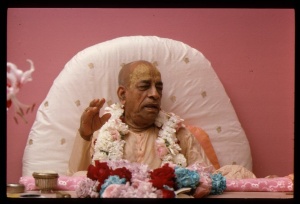CC Madhya 22.53

A.C. Bhaktivedanta Swami Prabhupada
TEXT 53
- naiṣāṁ matis tāvad urukramāṅghriṁ
- spṛśaty anarthāpagamo yad-arthaḥ
- mahīyasāṁ pāda-rajo-‘bhiṣekaṁ
- niṣkiñcanānāṁ na vṛṇīta yāvat
SYNONYMS
na—not; eṣām—of those who are attached to household life; matiḥ—the interest; tāvat—that long; urukrama-aṅghrim—the lotus feet of the Supreme Personality of Godhead, who is credited with uncommon activities; spṛśati—touches; anartha—of unwanted things; apagamaḥ—vanquishing; yat—of which; arthaḥ—result; mahīyasām—of the great personalities, devotees; pāda-rajaḥ—of the dust of the lotus feet; abhiṣekam—sprinkling on the head; niṣkiñcanānām—who are completely detached from material possessions; na vṛṇīta—does not do; yāvat—as long as.
TRANSLATION
"'Unless human society accepts the dust of the lotus feet of great mahātmās—devotees who have nothing to do with material possessions—mankind cannot turn its attention to the lotus feet of Kṛṣṇa. Those lotus feet vanquish all the unwanted, miserable conditions of material life.'
PURPORT
This verse appears in the Śrīmad-Bhāgavatam (SB 7.5.32). When the great sage Nārada was giving instructions to Mahārāja Yudhiṣṭhira, he narrated the activities of Prahlāda Mahārāja. This verse was spoken by Prahlāda Mahārāja to his father, Hiraṇyakaśipu, the king of demons. Prahlāda Mahārāja had informed his father of the nine basic processes of bhakti-yoga, explaining that whoever takes to these processes is to be considered a highly learned scholar. Hiraṇyakaśipu, however, did not like his son to talk about devotional service; therefore he immediately called Prahlāda’s teacher, Ṣaṇḍa. The teacher explained that he had not taught devotional service to Prahlāda but that the boy was naturally inclined that way. At that time Hiraṇyakaśipu became very angry and asked Prahlāda why he had become a Vaiṣṇava. In answer to this question, Prahlāda Mahārāja recited this verse to the effect that one cannot become the Lord’s devotee without receiving the mercy and blessings of another devotee.